How Compassion is changing the story of world hunger
Others, COVID-19 , HungerContributed by: Compassion Canada
One night, Mary returned home late from work to the sight of her children and their father sitting around a fire. Her heart sank at the look on their faces. It was one she had seen all too often.
“When I saw them, I knew they were hungry. My husband did not make money that day. When I asked if they had eaten, my husband said they had drank hot water,” she says. “We did not have any other food in the house, so I took the bucket of tomatoes I’d brought home, cut them into pieces and that was our supper.”
Like her husband Michael, Mary didn’t have the chance to attend secondary school. Growing up in a small village in Tanzania, she helped her parents on their farm until she got married. With only primary school education, the jobs she and her husband were eligible for did not pay well.
“When I moved to my husband’s village, I could not find work to do because no one knew me. So, I had to depend on him,” she says.
While her husband searched for whatever work he could find, Mary stayed home farming the piece of land her husband shared with his mother and four of his siblings. On their small portion, she planted maize and beans. It would take at least 60 days before they were ready for harvest.
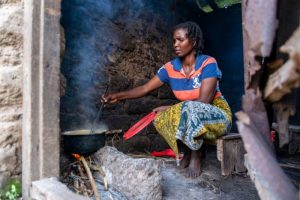
When Mary’s husband is able to make money in a day, she cooks a meal for her family over a fire in her home.
While they waited for their crop, the couple had to choose which meals to skip. As time went by, Mary’s neighbours got to know her and began employing her as a labourer. She mostly worked on their farms, plowing and weeding.
“I got my first job after one of my neighbours recommended me to her supervisor at a tomato plantation. I would leave home early and return late.”
Her family grew as well until the couple was raising four children together. “I thank God for my husband because whenever I was late, he would prepare food for our children. But that was if he had made money that day. If he didn’t, they would wait for me to come home,” she says.
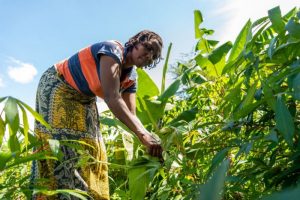
The sight of her children withering away from hunger weighed deeply on Mary’s heart. To make sure that her children ate, she would sometimes beg for food from her neighbours. Occasionally, her father would send her some food. Still, life became increasingly desperate.
“I remember when I was nursing my third child, I could not produce milk. So, I drank hot water to see if I could produce even a little,” says Mary.
Despite all their efforts, Mary and Michael always fell short. The money they earned was never enough, and their harvest kept them fed for just a few months.
Two months before their youngest son Apolinari’s second birthday, the first COVID-19 case was reported in Tanzania. Just a few weeks later, Mary and Michael felt the pinch of the pandemic in their pockets. “I went from making TSHS 7,000 (CAD $3.96) in a day to making TSHS 3,000 (CAD $1.69). Even that TSHS 3,000 was not guaranteed.”
COVID-19 a “hammer blow” for those in poverty
Sadly, Mary’s story is not uncommon. For caregivers living in poverty, COVID-19 has made a bad situation worse. The anxiety of providing for their families with such low resources has been expounded tenfold by rampant unemployment among other life-altering repercussions of the pandemic.
“COVID-19 is potentially catastrophic for millions who are already hanging by a thread,” says Arif Husain, Chief Economist of the World Food Programme. “It is a hammer blow for millions more who can only eat if they earn a wage. Lockdowns and global economic recession have already decimated their nest eggs. It only takes one more shock — like COVID-19 — to push them over the edge. We must collectively act now to mitigate the impact of this global catastrophe.”
And as if this urgent and collective call to action is not enough, the projected statistics of the amount of people destructively impacted is equally sobering:
- 10,000 more children a month are dying from virus linked-hunger this year.
- 840 million people are projected to go hungry by 2030 if trends continue.
- 130 million people could face acute food insecurity by the end of 2020, on top of the 135 million who were already food insecure before the crisis.
Besides income loss due to COVID-19 layoffs, other factors like astronomical food prices and school closures have made keeping children’s bellies full nearly impossible for caregivers living on the brink or in the very middle of extreme poverty.
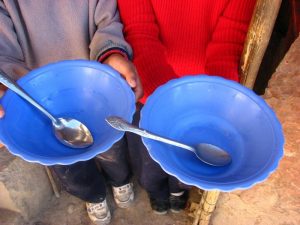
According the UN, supply chain disruptions caused by the pandemic mixed with an increase of consumer demand for food have resulted in colossal food price increases around the globe, intensifying the gravity of food insecurity for 821 million hungry people in low-income countries who already spend most of their income on food.
The closing of schools around the globe has forced more than 1 billion children out of school, which has cut off their access to school-run meal programs that provide essential meals to children who come to school every day with empty stomachs.
All of these sharp realities and more are projected to increase global poverty for the first time since 1998, reversing decades of global progress against world hunger.
In light of these sobering statistics and stories of desperation, what can be done?
Changing the story with immediate and long-term solutions
At Compassion, we have seen stories like Mary’s time and time again. But each time, we are encouraged to see the ways our local church partners step in to provide immediate relief along with long-term and sustainable solutions.
Our unique church-driven model allows the children and families in the countries where we work to be seen and known. The churches we partner with live in the same neighbourhoods as the children and families they serve. They know the names of the families in their community. They know their faces. This means they are the best equipped to provide sustainable solutions to issue like acute hunger.
With the help of our generous donors, our local church partners are at the ready to respond to the hunger crisis that has been worsened by COVID-19. Here are just a few ways Compassion is helping to make hunger history in the lives of the children we serve.
- Immediate relief
As the pandemic continues to devastate millions of children and families in poverty throughout the world, Compassion continues to bring immediate food relief paired with sustainable solutions to allow families to receive their daily bread in the now, and long-term security for the future.
So far, Compassion has delivered more than 7.1 million emergency food kits to families in need. These food kits include essentials like rice, oils, oats, milk, corn and meat. With the help of our supporters, we have also distributed more than 254,000 unconditional cash transfers.
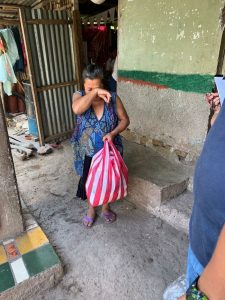
Grandmother, Reina, moved to tears by an emergency food pack delivered from a local Compassion centre.
For caregivers like Reina, this relief is completely life changing.
Raina and her grandson ran out of food and had nowhere to turn. “If not for Compassion’s rapid response, Reina and her grandson would have been left hungry,” says Ninfa, a Compassion centre director in Honduras.
- Education
Mary, whose story is noted above, is just one of the people whose situation has been impacted by having local Compassion centre staff educate her on the ways to utilize natural resources around her to provide for her family.
“We decided to teach parents how to use the foods that were around them to make balanced meals. We taught each one of them individually during home visits,” says Rehema, the director of the Compassion centre where Mary and her family now receive support.
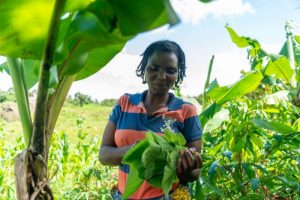
Mary harvests pumpkin leaves to use for food, as taught by her Compassion centre director.
“When she visited me, I showed her our farm,” says Mary. “I had planted pumpkins and cassavas. I knew I could eat the leaves of both plants, but I did not know how to process cassava leaves. She taught me how to. I am glad I will not see my children starving again,” she says.
- Income-generating initiatives
Our church partners in countries around the globe have developed creative ways in which families in their community can keep earning an income, even after COVID-19 related job loss. Initiatives like vegetable farming, pig-rearing, cat-fish farming, sewing, basket weaving and more allow families to receive all the materials and training they need to generate their own income during and after the pandemic.
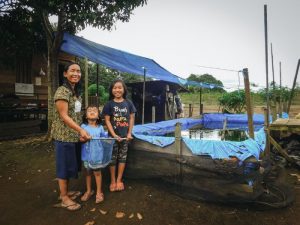
Lusiana and her two daughters in front of their catfish pond and vegetable garden provided by their Compassion centre.
Lusiana from Indonesia is just one of the many caregivers who can now provide food for her children because of Compassion’s income-generating initiatives.
“Now I don’t need to worry about what my family will eat tomorrow. I have vegetables and a fishpond beside my house, and I can take the vegetables and the fish and serve them to my family. I can sell them for money, too.”
Walking together into a better future
Compassion’s church partners were there before the COVID-19 pandemic and will be there long after. We believe that knowing the stories and the faces of the children and families we serve is vital in providing long-term, sustainable support. We believe in partnering with those who live in the very neighbourhoods of those we serve — those who know their context and their way of life.
We believe in standing together as a global community with those on the frontlines and those behind the scenes to see more and more children and families freed from the bondages of poverty and extreme hunger today, tomorrow and for the long haul, in Jesus’ name.
Written by Laura Phillips.
Field Reporting by Eric D. Lema.
Photos by Eric D. Lema, Gaila Oropeza, Juana Ordonez Martinez and Vera Aurima.
Feature photo of Mary’s two-year-old son, Apolinari.
Originally published on: https://compassionca.medium.com/how-compassion-is-changing-the-story-of-world-hunger-5c9075c469a5

